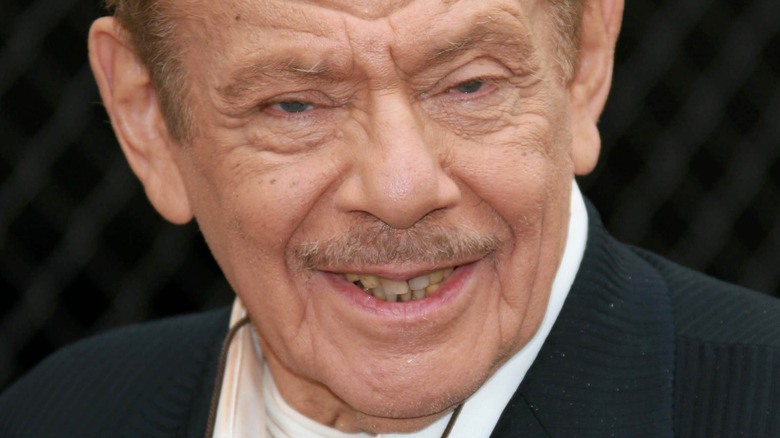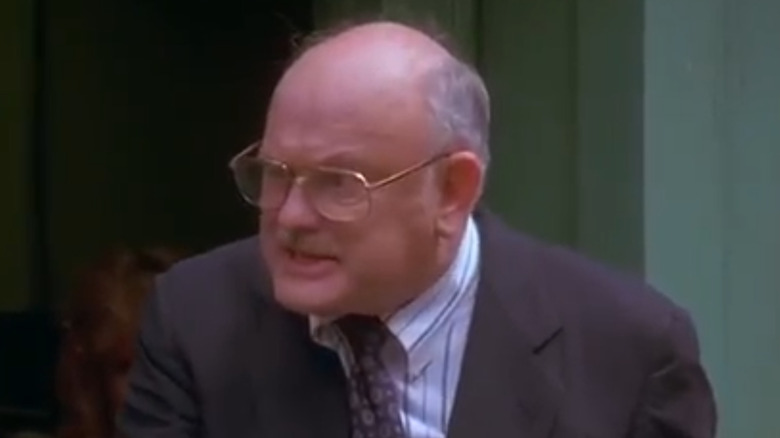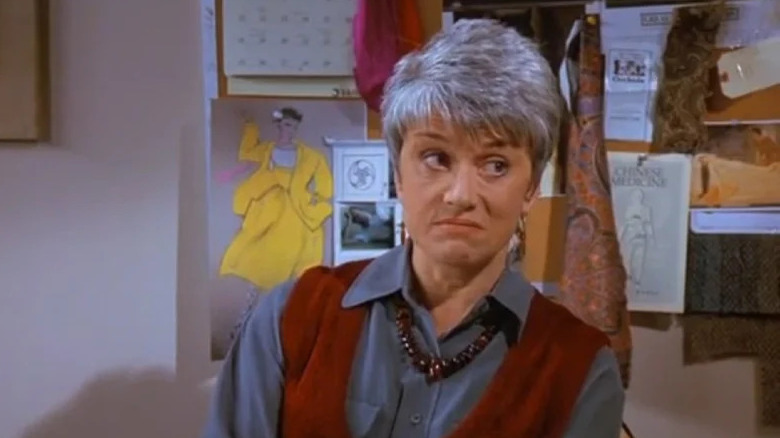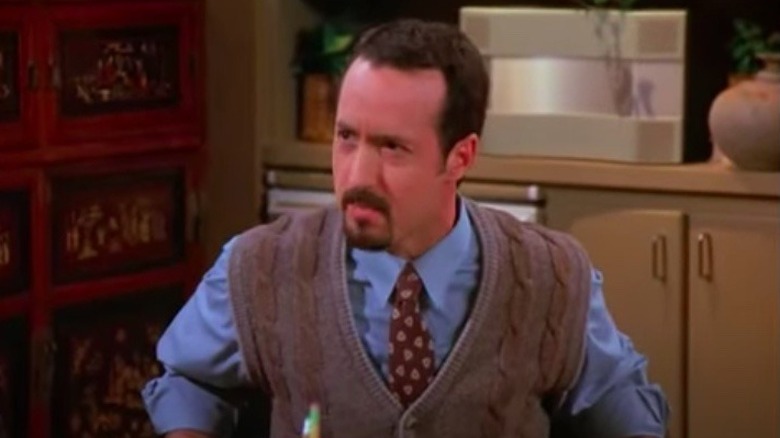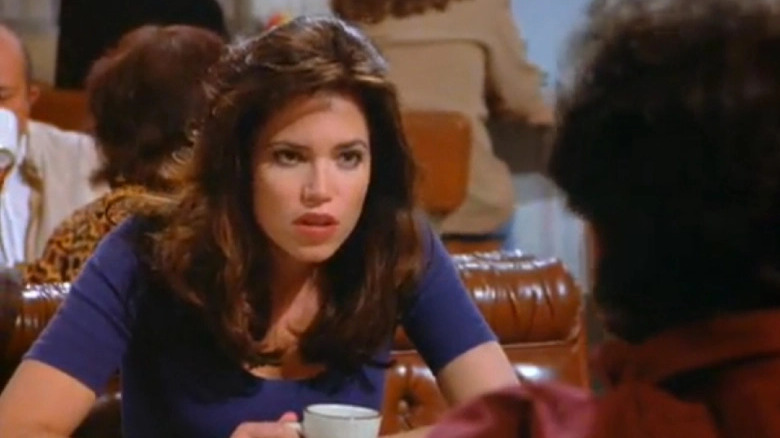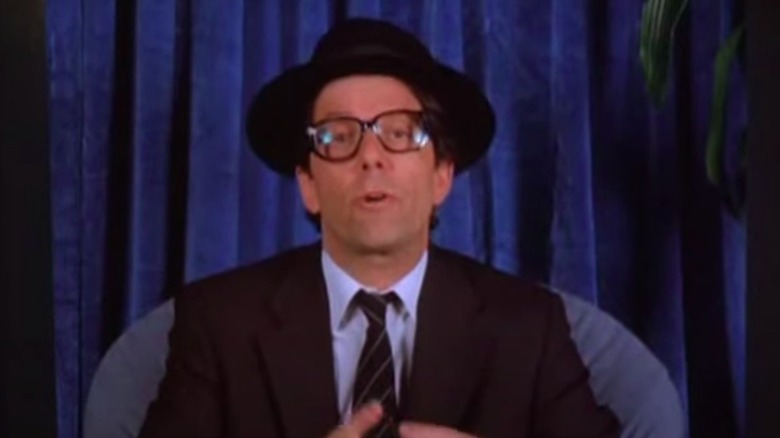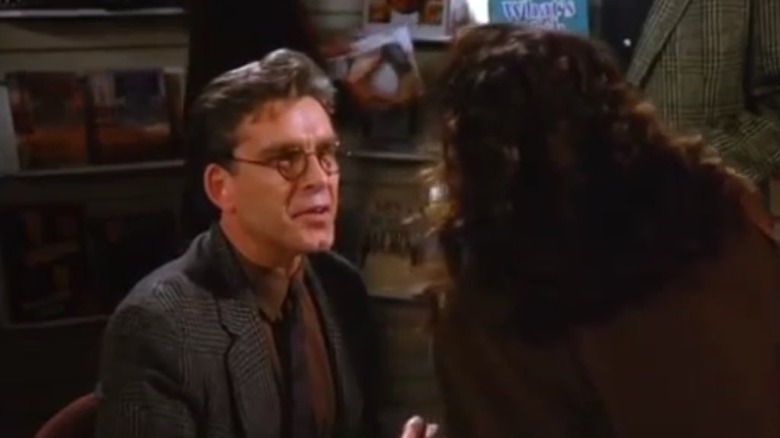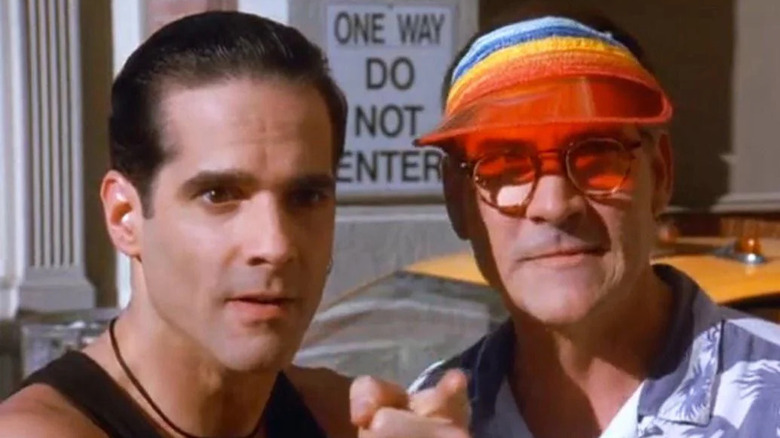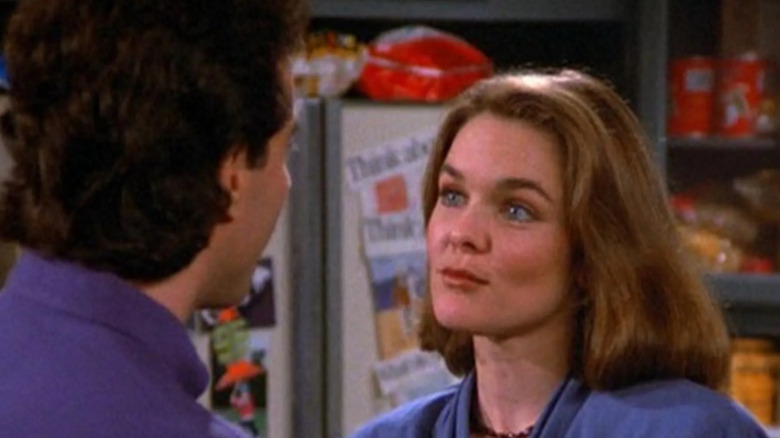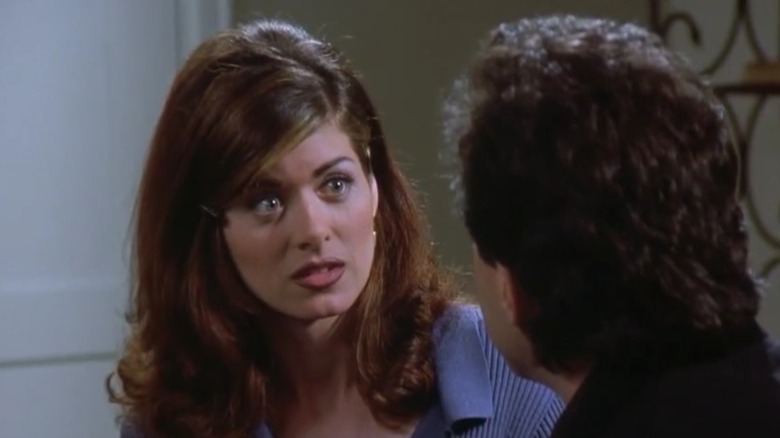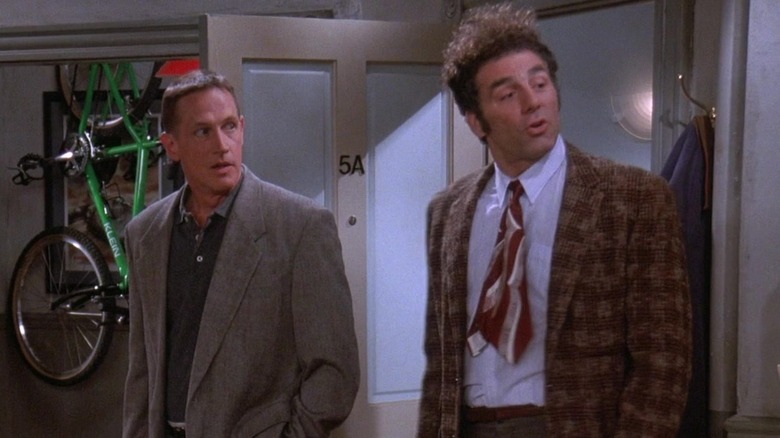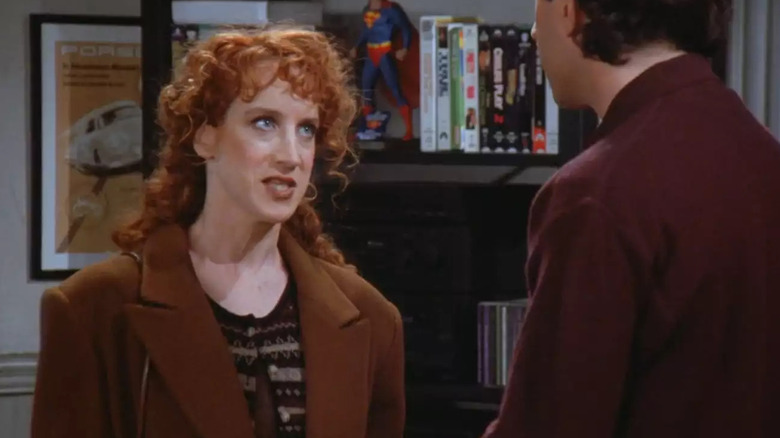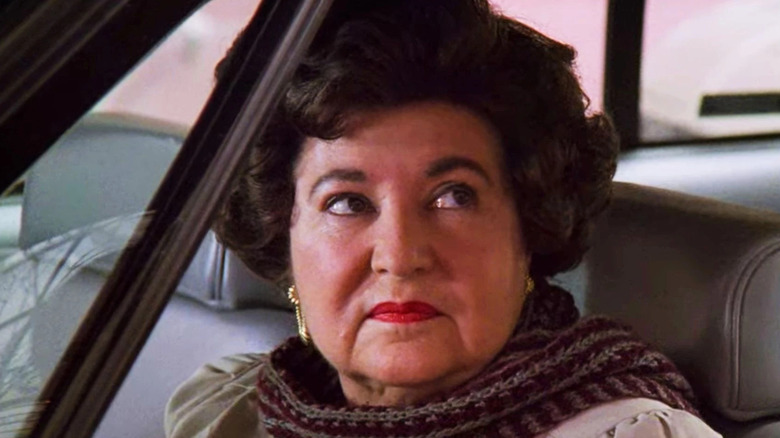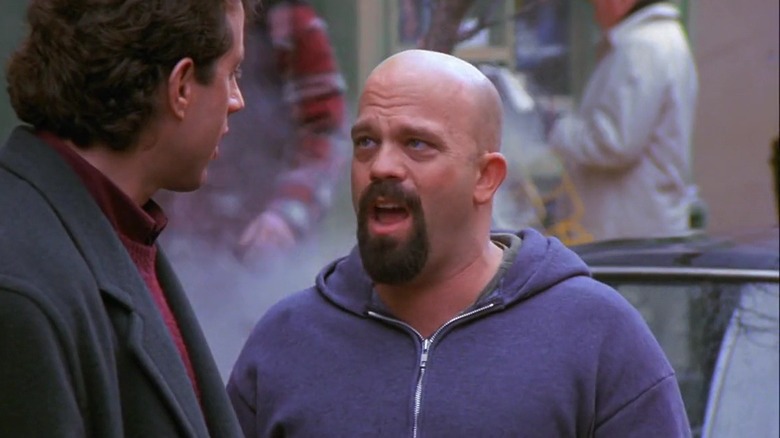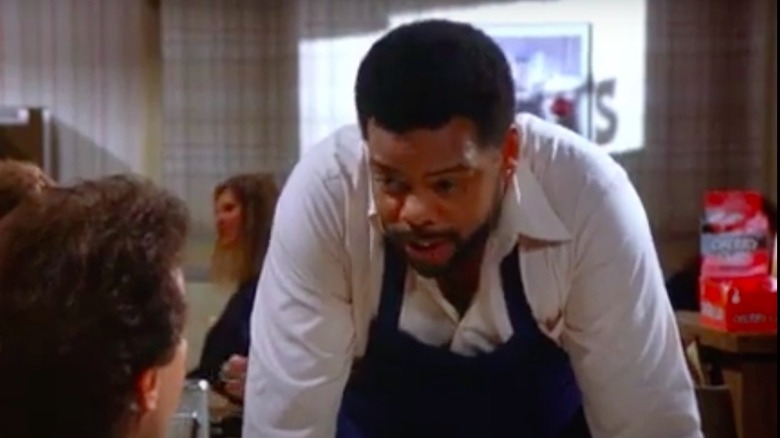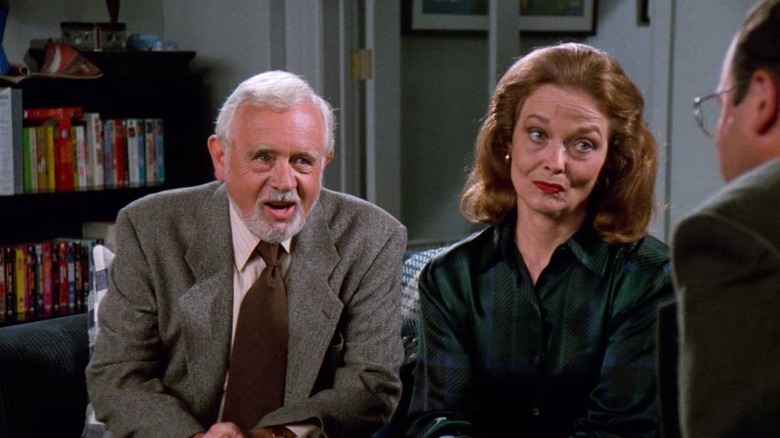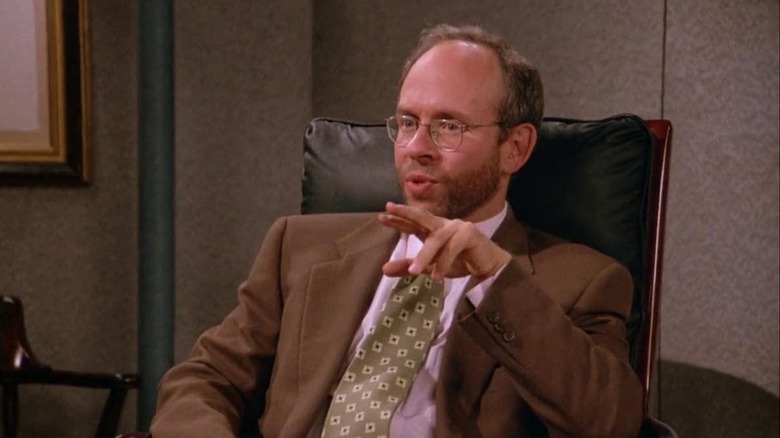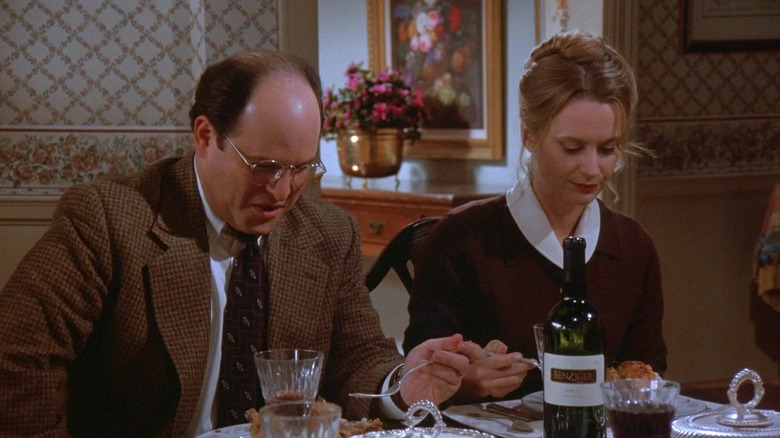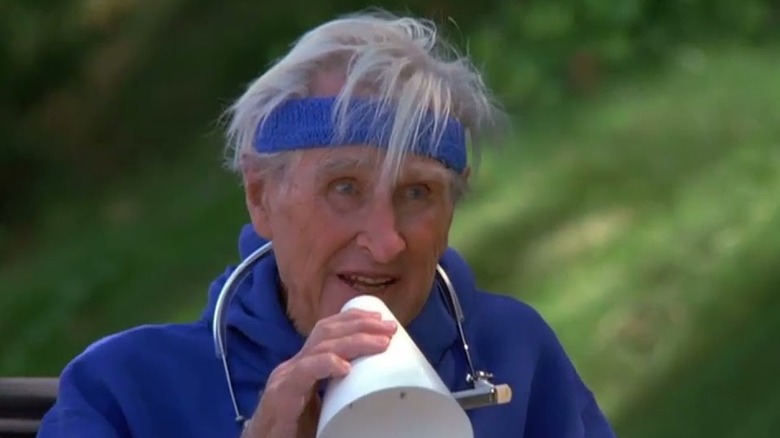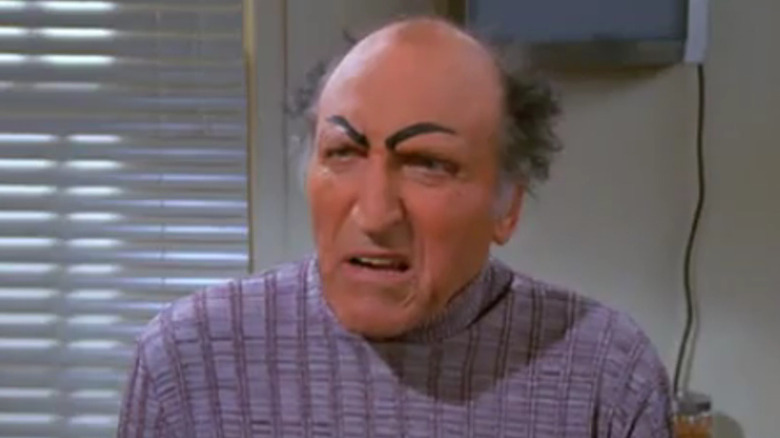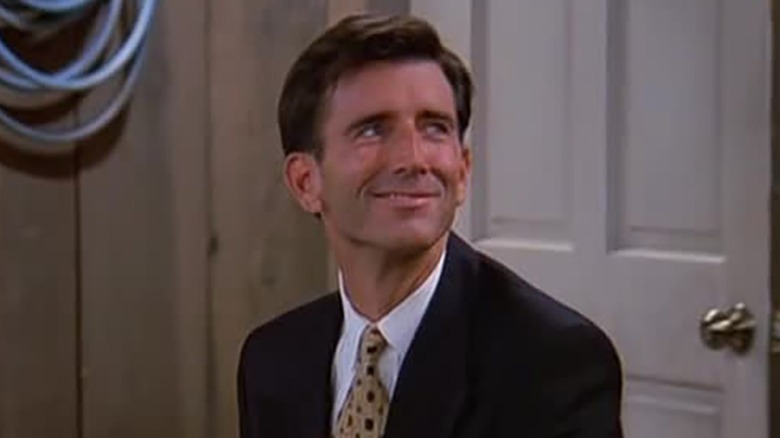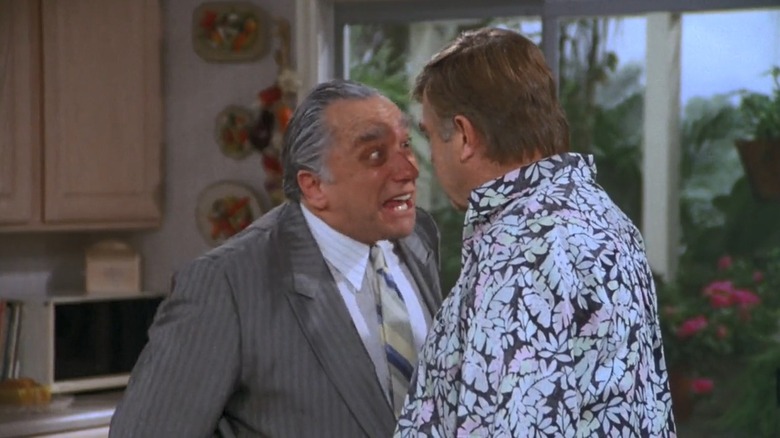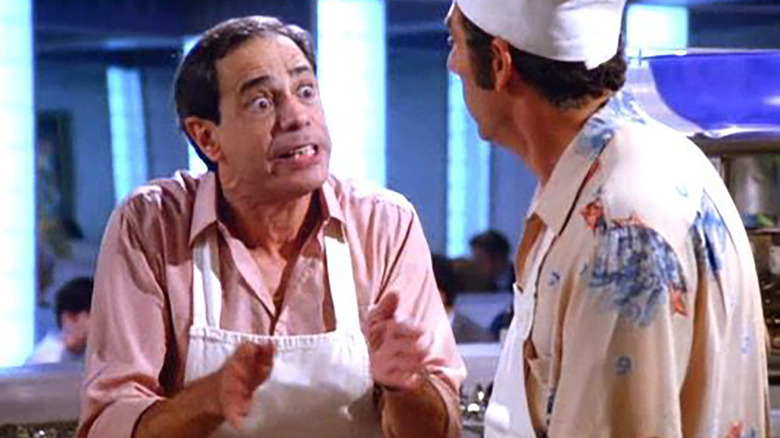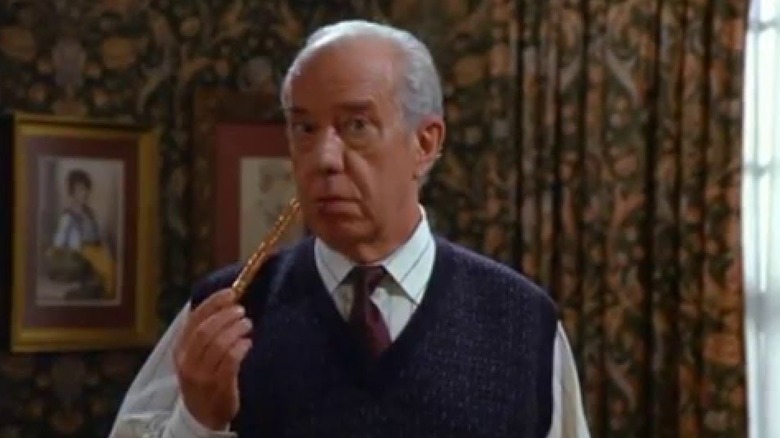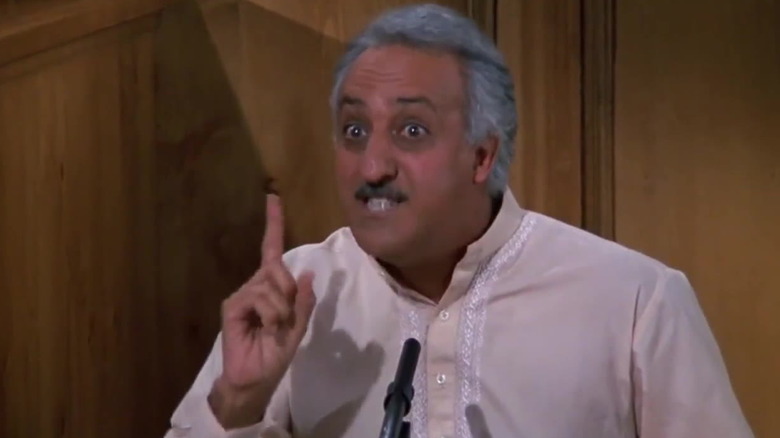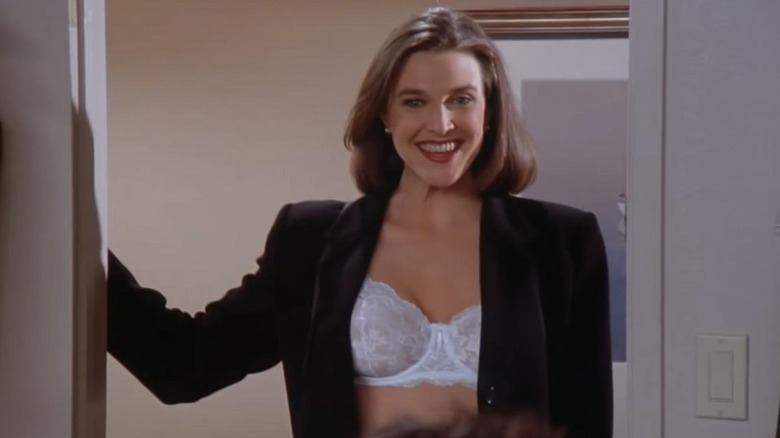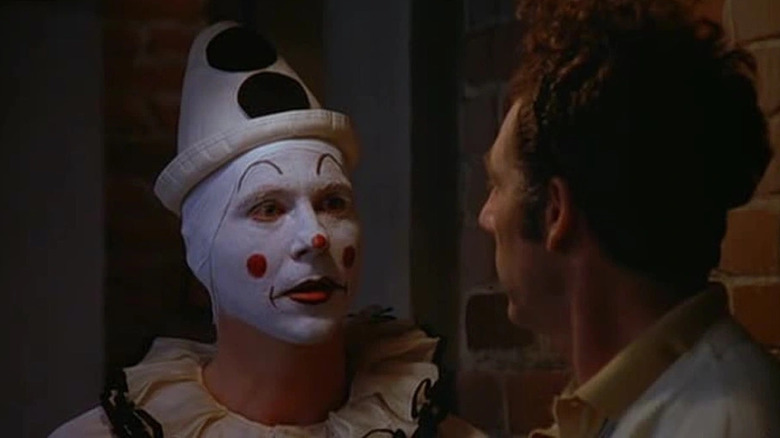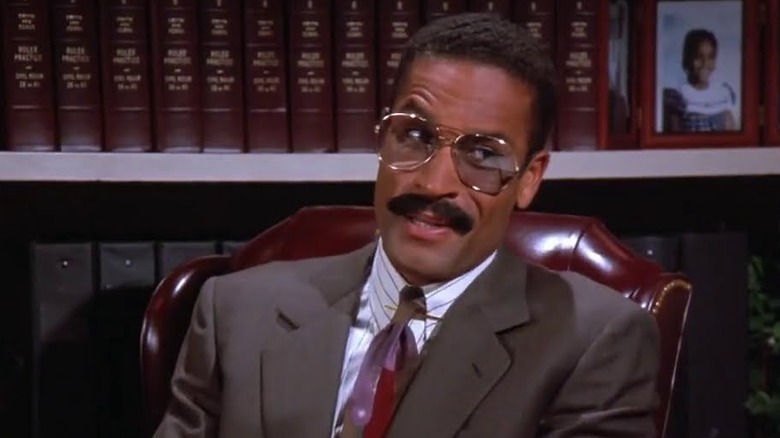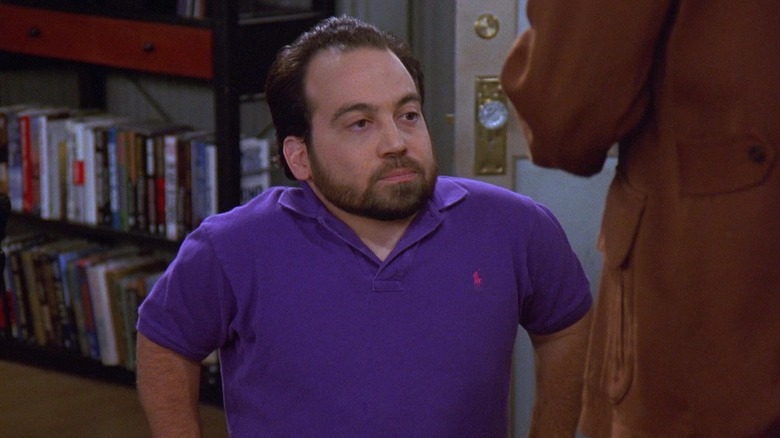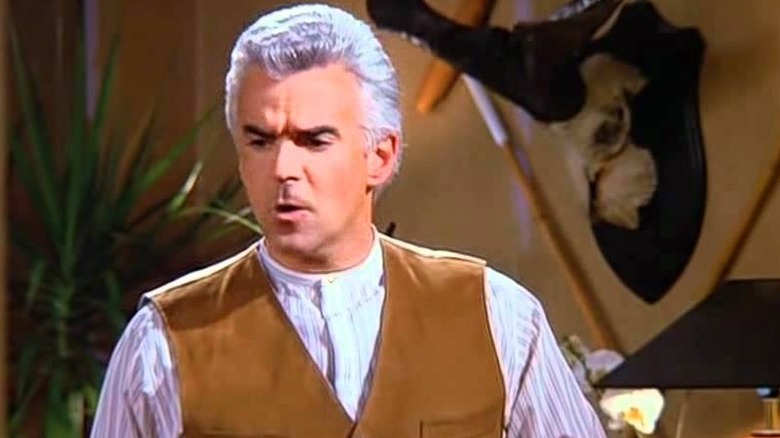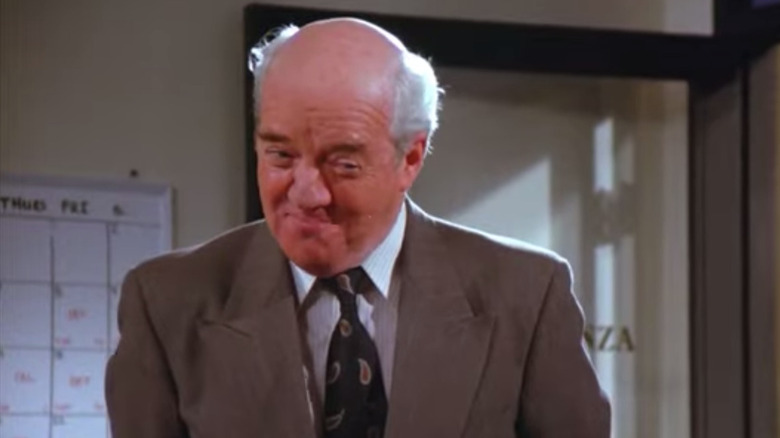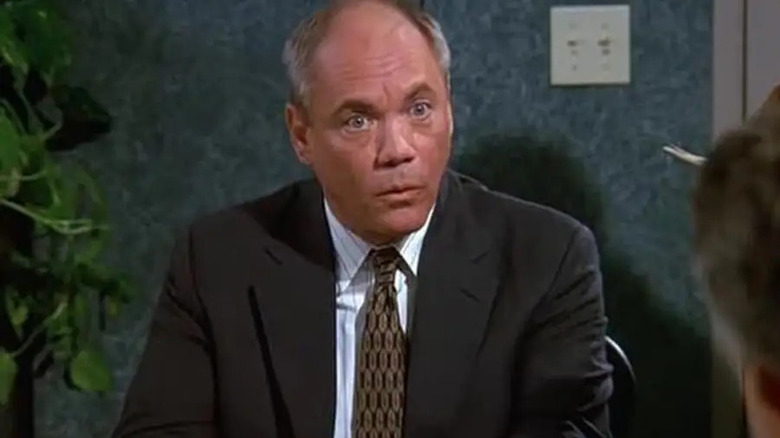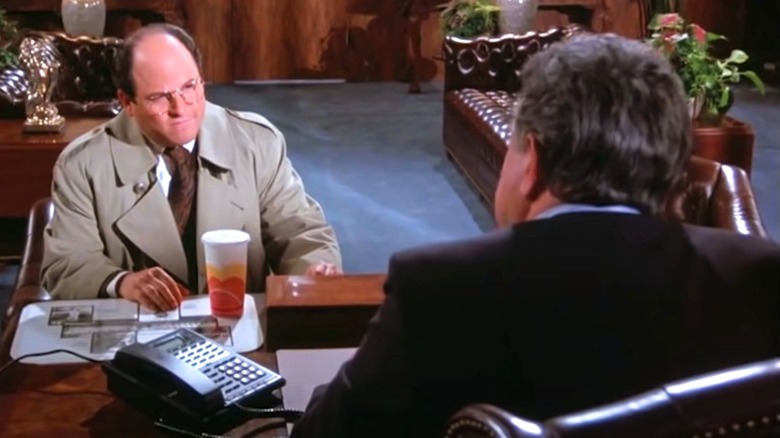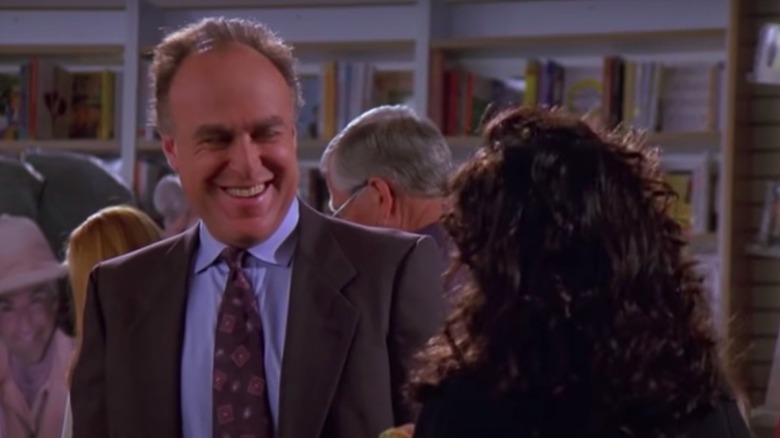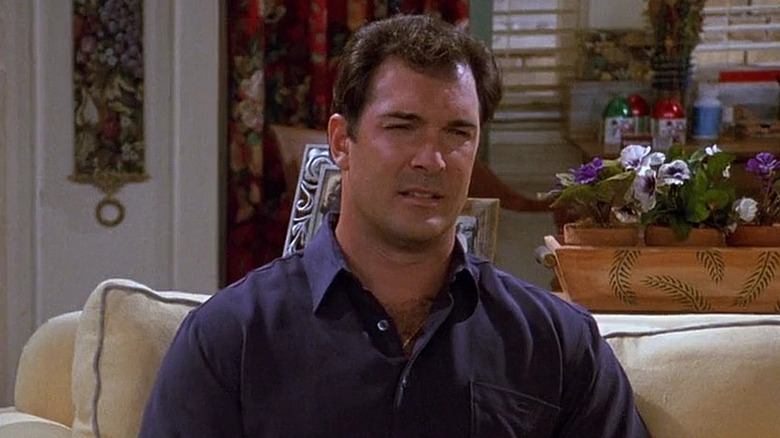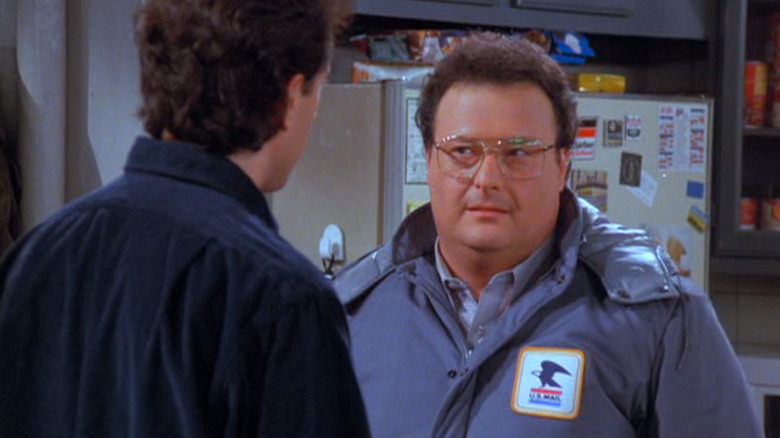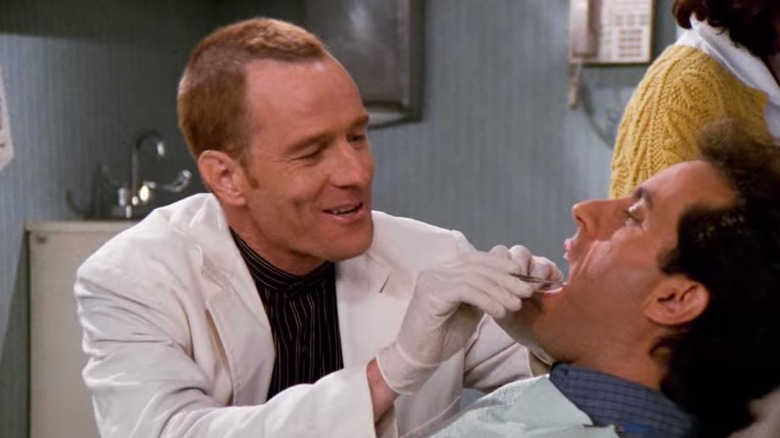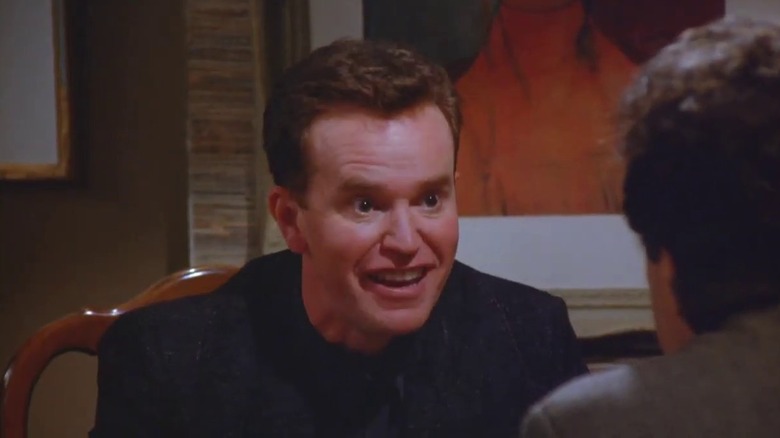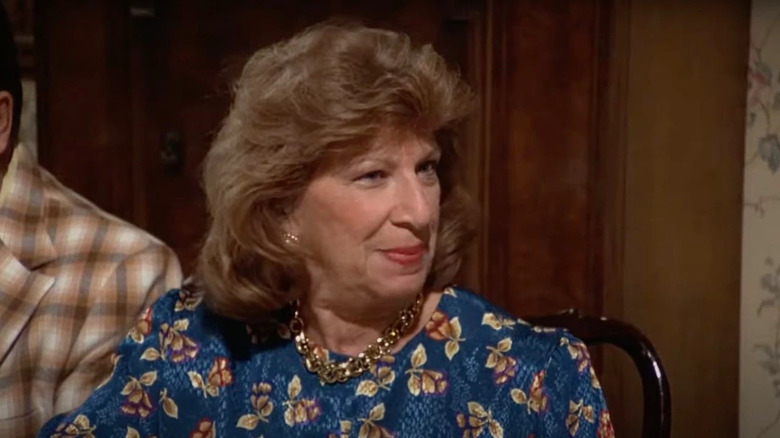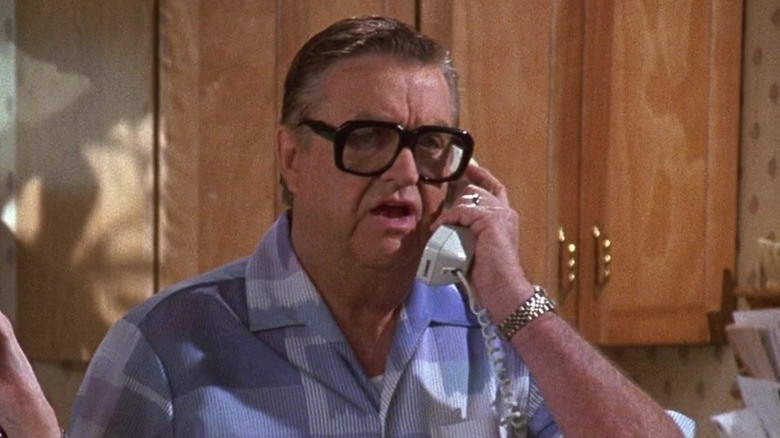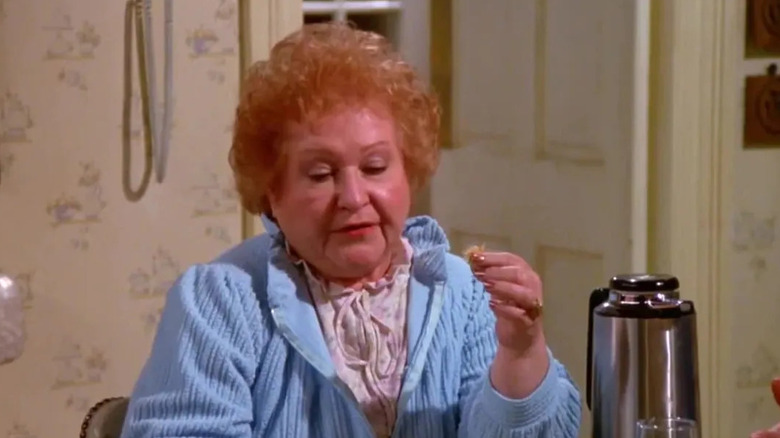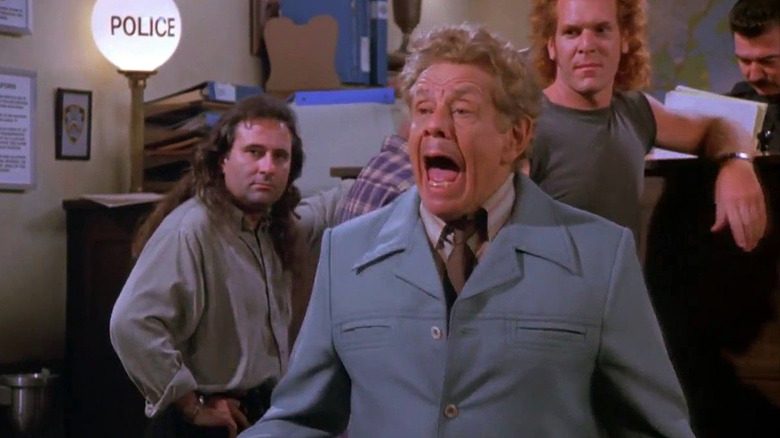Ranking Every Seinfeld Secondary Character From Worst To Best
"Seinfeld" is one of the most inventive and popular sitcoms ever produced. Comprised of nine seasons and dozens of memorably hilarious episodes, it stands the test of time as one of the funniest American TV shows of all time. From season to season, the show continues to delight audiences with its main character roster of selfish, cynical misfits and their harebrained hijinks.
While the concepts behind the episodes themselves remain one of the strongest aspects of "Seinfeld," perhaps the biggest feature that accounts for the show's continued success is its variety of vibrant, over-the-top characters. While each of the four principal characters are equally essential to the dynamic, the show also makes clever use of its minor players, even characters who only appear in a single episode of "Seinfeld."
We mean no disrespect to Jerry, Elaine, Kramer, or George, but it's the long list of supporting characters that makes "Seinfeld" such a great and entertaining sitcom. From eccentric employers like J. Peterman and George Steinbrenner to oddball parents like the hotheaded Costanzas, here all are of the major secondary "Seinfeld" characters ranked from worst to best.
41. Thomassoulo
Perhaps the least memorable boss portrayed by a member of the cast of "Seinfeld," Thomassoulo is George's short-lived employer in the final season of the series. The branch manager at local company Play Now, he hires George with the promise of numerous accommodations and benefits under the false pretense that George is physically handicapped.
When he discovers George has been faking the entire time, a disgusted Thomassoulo and his Play Now employees do whatever they can to get George to quit, sabotaging his office and making his life miserable. George, however, resolves to remain at the company as long as possible in the hopes of fulfilling his one-year contract and receiving his hefty salary package.
The idea of a company being stuck with George against their will is promising, with Thomassoulo having a few great scenes with George during their bitter battles at Play Now. Unfortunately, the character only appears in two episodes before Play Now is doomed to bankruptcy thanks to a costly lawsuit caused by George in "The Voice." If he was in more episodes, he might place higher on this list. Sadly, Thomassoulo doesn't measure up to the famously quirky nature of other employers like Peterman, Pitt, and Steinbrenner.
40. Peggy
A designer at the J. Peterman Catalog, Peggy has two run-ins with Elaine in Season 9 of "Seinfeld." In "The Susie," Peggy mistakenly believes Elaine is another coworker named Susie and badmouths Elaine behind her back. In "The Apology," Peggy pops up again, inoculating herself whenever she comes into contact with Elaine, asserting that — because Elaine is "around a lot of men" — she's almost certainly riddled with germs.
An ardent germaphobe and office gossip, Peggy's repeated clashes with Elaine provide some of the most underrated moments in "Seinfeld," such as Elaine purposefully coughing on Peggy's doorknob or rubbing her keyboard on her backside. Of course, as the type to complain about people when they're not around, Peggy is also a tad annoying, which results in her low ranking here.
Still, there is a certain element of truth in her complaints about Elaine — we see Puddy rant about Elaine's questionable hygiene habits right in front of her.
39. Dugan
Another one of Elaine's colleagues at the J. Peterman Catalog, Dugan is the most straightforward and easy to understand of Elaine's coworkers and makes his disdain for her as plainly known as possible. Repeatedly mocking her to her face and behind her back, Dugan is a head writer at the catalog who instantly dislikes Elaine when she starts off at the company. As she climbs through the corporate ranks, his strong antagonistic feelings toward her only increase, and Elaine loses the respect and support of her employees as her tenure as acting president of the company drags on.
Like Peggy, Dugan really isn't seen enough to qualify as the greatest "Seinfeld" side character. However, it's almost always amusing to see him flat out make fun of Elaine, her inept work ethics, and nonexistent managerial skills whenever he makes an appearance.
A delightful side character, his terse reactions to some of Elaine's worst office decisions are always amusing. These include his rage-filled outburst upon hearing Elaine promote an unqualified mailroom attendant in "The Fatigues" instead of him, or his subtle digs at her shockingly poor dance movies in "The Little Kicks."
38. Rachel Goldstein
Jerry dates plenty of women throughout the course of "Seinfeld," many of whom deserve a distinguished place on this list. However, arguably the most memorable among them would be Rachel Goldstein, one of the few women Jerry is shown dating for more than a single episode.
Appearing in a total of four episodes, Rachel is seemingly introduced as a one-off flame whose relationship with Jerry is sabotaged by Newman. Though her parents forbid her from seeing Jerry, the two continue their trysts throughout the rest of Season 5, vacationing together in "The Hamptons" and breaking up in "The Opposite."
Rachel may not be the best woman Jerry ever dates, but her antagonistic relationship with George is reason enough to include her here. As seen in "The Hamptons," she unknowingly stumbles into George's room while he's changing, resulting in the famous "shrinkage" incident that kicks off a feud between the two and lasts the episode. Additionally, the nonchalant way she and Jerry agree to break up also may just be the funniest end to a relationship in the entire show — save, perhaps, for the several times Puddy and Elaine break up over the seasons.
37. Rabbi Kirschbaum
A rabbi with loose lips, Rabbi Kirschbaum is a local religious leader who lives in the same apartment building as Elaine. Known for his overenunciation of words, he's a source of guidance for many people, including those of a dissimilar faith. Always ready to offer helpful advice to those in need, Kirschbaum has noble intentions, but is frequently prone to voicing the private concerns of others aloud rather than keeping them confidential. The most extreme example of this is found in his debut episode, Season 7's "The Postponement," when he discusses at length the personal issues Elaine faces on his cable TV show.
Seldom do we see the gang actually discuss their feelings and insecurities with others, which makes it all the more humorous when such private confessions are made known to the wrong people. Rabbi Kirschbaum means well, but his straightforward nature and lack of social awareness always end up hurting those who choose to confide in him.
The Rabbi appears in a small number of episodes following this initial appearance, each time usually causing more harm than good when it comes to his spiritual or personal life advice. Most memorably, he is one of the numerous Jewish men who end up hopelessly and irrationally falling in love with Elaine for her "shiksappeal."
36. Jake Jarmel
The leading characters of "Seinfeld" are infamous for breaking up with their significant others for ridiculously mundane reasons, such as George breaking up with a girlfriend because she beat him at chess or Jerry choosing soup over a woman he's dating. Perhaps the most ludicrous breakup came in Season 5's "The Sniffing Accountant," in which Elaine breaks up with her boyfriend Jake Jarmel for failing to put exclamation points on an important message.
A successful author who appears as Elaine's boyfriend several times, Jake is one of the most reasonable men Elaine gets romantically involved with. He's intelligent, confident, and handsome to boot, yet Elaine's pettiness over his punctuation and her decision to purchase Jujyfruits even after learning he was involved in a car accident causes Jake to irately break up with her on two separate occasions.
However, it's his final appearance in Season 6's "The Scofflaw" that makes Jake a great character. Now in an outright heated rivalry with Elaine, he proves himself to be every bit as shallow and smug as his former girlfriend by going out of his way to ensure he's the only one who owns the special brand of glasses he got in Malaysia. With attitudes like theirs, it's almost like Elaine and Jake were made for each other in their own twisted way.
35. Cedric and Bob
A pair of local street toughs who occasionally cause problems for the gang, especially Kramer, Cedric and Bob are an interesting pair. Loyal life partners, they're shown to display genuine warmth and affection for one another, as well as an air of sophistication when it comes to matters of design or fashion. The moment they perceive an outside threat, though, they immediately turn into aggressive bullies, threatening anyone unfortunate enough to cross their path with physical violence.
The main thing to love about Cedric and Bob is their complete lack of predictability. One minute, they could be admiring an armoire together, the next they'll be talking trash to a complete stranger they meet on the street. Even Cedric — the seemingly quieter, more rational of the two — is shown to react tersely when approached by someone he's unfamiliar with.
They're a rough crowd to hang around with, yet we have a feeling that if you got on their good side, they'd be a joy to be around. If you happened to offend them or catch them on an off day, however ... well, that's an entirely different story.
34. Dolores
Another woman Jerry dates until their inevitable breakup, Dolores — occasionally known as "Mulva" among Jerry's friends — is pretty much as good as a girlfriend gets. She's nice, polite, warm, friendly, outgoing, and had great chemistry with Jerry during their time together. The only problem is that when they're dating, Jerry is unable to remember her name. In fact, the entire episode she first appears in, Season 4's "The Junior Mint," is built around Jerry trying to figure out what her name really is. His only hint is it "rhymes with a part of the female anatomy."
The mystery behind Dolores' name results in an amusing concept for an episode. By the end of "The Junior Mint," a justifiably angry Dolores ends her relationship with Jerry when she discovers he's unable to recall her first name. All he can do is fruitlessly call out, "Dolores! Dolores!" as she storms away.
Dolores makes a return in Season 8's "The Foundation," agreeing to go out with Jerry after learning about the end of his engagement. As you might expect, the date goes awry when Jerry tells Dolores that the decision to end his engagement was a mutual one, leading the disbelieving Dolores to call Jerry immature before storming out. Considering Jerry's apparent childish tendencies, it's certainly hard to argue that point.
33. Beth Lukner
Every once in a while on "Seinfeld," viewers might spot a familiar face — an actor or actress who went on to achieve success or exposure later in their career. Such is the case with Beth Lukner, played by Debra Messing of "Will & Grace" fame. In "Seinfeld," Messing's Beth is a well-off physician happily married to her salesman husband, David (played by Cary Elwes) who makes her first appearance in Season 7's "The Wait Out."
In that episode, George makes a bad joke in front of the couple about the fact that Beth is a physician and David is only a salesman, which prompts an argument between the two that leads to their separation. Perversely, both Elaine and Jerry have anticipated this breakup for years, "waiting out" the happy couple's marriage so that they can then begin dating David and Beth, respectively.
Ultimately, after her failed attempt to get back together with David and a brief marriage to a man named Arnie (which is ruined by Elaine), Jerry finally begins seeing Beth on a more romantic basis. The relationship comes to a screeching halt, however, when it's revealed that Beth harbors not-so-secret racist and anti-Semitic views.
32. The Maestro
The eccentric conductor of the Policemen's Benevolent Association Orchestra, Bob Cobb — "The Maestro," as he exclusively likes to be called — is arguably one of the most peculiar individuals the main characters of "Seinfeld" ever encounter. Charismatic, flamboyant, and theatrical, he sees himself as a conductor on par with the best, leading to his preference to being called "Maestro" instead of his given name.
Completely invested in his work, he's the kind of guy who hears a classical symphony and hops to his feet, passionately shutting his eyes and waving his conductor's baton around as though he's the one actually conducting the piece. He may rub some people the wrong way by coming across as a bit boorish and full of himself, but you have to admire how plainly he loves his work.
Idiosyncratic in his behavior, mannerisms, and dramatic speaking voice, the Maestro is one-of-a-kind character we would've loved to have seen more of in the show. His indignation at being called Bob, his insistence on being called Maestro, and how casually he strolls around a room with no pants on (apparently, sitting causes creases) make him a character who's always a bundle of fun.
31. Sally Weaver
Every so often, Jerry meets a character who's every bit as awful and annoying as he is. The most notable of these has to be Sally Weaver, the former college roommate of Susan Ross and one of Jerry's de facto archenemies. Played by the famous comedian Kathy Griffin, Sally is a regular thorn in Jerry's side, ruining his act several times in her first appearance, Season 7's "The Doll."
In her follow-up appearance in Season 9's "The Cartoon," Sally evolves from a character who only mildly inconveniences Jerry to someone who flat-out hates him. After Jerry tells Kramer that Sally should give up on her dreams of becoming an actress and Kramer repeats this sentiment to Sally seconds later — quickly clarifying, "That's what Jerry says" — Sally creates an entire standup routine called "Jerry Seinfeld is the Devil." Ironically, the show is a huge success. Newman sees it a total of six times, and opines, "It's so great to see a show that's about something."
An infuriating woman who isn't even aware of the problems she's causing, Sally is one of the few characters that Jerry has adequate reason to dislike. Selfish and obnoxious, she is unable to pick up on social cues about just how aggravating her behavior can be. She's a character you just love to hate. Although, considering how awful Jerry can be sometimes, you can't help but feel like he deserves every little issue she causes for him.
30. Ruthie Cohen
Ruthie Cohen is a unique character for a few reasons. For starters, she's one of the only "Seinfeld" characters whose name matches that of her actor, Ruth Cohen. Additionally, she's also the character who appears in the most episodes in the series aside from the main cast, having been featured in a total of 101 episodes throughout the nine-season run of "Seinfeld."
The cashier at Monk's Café, Ruthie Cohen can regularly be seen in the background of most scenes at the restaurant. However, she's far from a simple stock character used to fill in the background. In several episodes of "Seinfeld," she interacts with the main characters, usually providing a disbelieving stare whenever they say or do something strange, which is quite often.
Ruthie's shining moment, though, is her appearance in Season 7's "The Gum." When George believes Ruthie shortchanged him on a bill, he begins blaming her and Lloyd Braun for virtually all of his troubles. Ruthie inadvertently nearly pushes George over the mental edge when he starts randomly seeing her around town, including once on horseback. George drifts into full-blown breakdown territory; meanwhile, Ruthie is completely oblivious to the whole affair.
29. Mike Moffitt
A close friend of Kramer's, Mike Moffitt is one of the several "Bizarro Georges" that appear in the show, possessing a similar personality and physical appearance to everyone's favorite "short, stocky, bald man," as George is commonly described. A cantankerous and angry man first seen in Season 3's "The Parking Space," Mike gets into a heated argument with George over a parking space they both pull into at the same time. In that same episode, Jerry holds a grudge against Mike for calling him a "phony" behind his back; ironically, the two-faced Mike is the biggest phony of them all.
Mike's second appearance in "Seinfeld" comes with Season 9's "The Susie." Now an aspiring bookie, Mike loses a bet with Jerry and can't pay it back, leading to several incidents that invert the standard relationship between bookies and deadbeat clients.
With each of his two appearances in the show, Mike provides a few standout moments in "Seinfeld" history. There's his lengthy standoff with George in the streets, his hapless attempts to explain to Jerry that phony is actually a compliment, and his worsening luck as a bookie who believes Jerry is actually trying to kill him over his debts. It also helps that Mike just happens to be in two of the strongest episodes of "Seinfeld."
28. Larry
Larry is the stern, no-nonsense owner, manager, and head cook of Monk's Cafe. Appearing in a handful of episodes, he typically only appears to argue with the main characters of "Seinfeld," who he very clearly dislikes. Perpetually cranky, he's known for threatening anyone who breaks the established rules of his diner, including anyone who smokes, like Kramer, or speaks too loudly in his restaurant, like George or Jerry.
Larry isn't as prominently featured as some of Monk's other staff members, but it's always humorous to see him put the "Seinfeld" gang in their place. With his intimidating demeanor, low voice, and lack of patience for any of their shenanigans, he's a figure of authority in Monk's that you don't want to cross. He doesn't even need to make explicit threats to get his point across; all he has to do is lean over your table and ask you politely, and you'll stop whatever's bugging him.
27. Mr. and Mrs. Ross
Mr. and Mrs. Ross are the wealthy socialite parents of Susan Ross, George's girlfriend and later fiancée in one of his main story arcs. Privileged, snooty, and pretentious, they're shown to be surprisingly similar to George's parents in more ways than one, despite initially coming across as the complete opposite of Estelle and Frank Costanza.
The most obvious similarity between the two couples is how little affection or love they hold for one another. In their first few appearances in the show, they regularly make snide comments about each other, targeting their partner's individual insecurities and shortcomings. But as in most cases, opposites don't always attract, with both the Costanzas and the Rosses getting off to a bad start when they first get together over dinner and immediately dislike each other. After Susan's death at the end of Season 7, the Rosses do grow somewhat closer as a result of the tragedy. Believing George to be responsible for Susan's demise, they form a long-standing grudge against him, hinting several times that they've tried to figure out ways to get revenge.
Because the Rosses are the least featured parents on "Seinfeld," they don't rank nearly as highly as the Seinfelds or the Costanzas, but that definitely doesn't mean they're not entertaining every time they're on the show. It says a lot that any couple could be more toxic than Frank and Estelle, but the Rosses definitely hold that esteemed (dis)honor.
26. Russell Dalrymple
Played by the supremely underrated Bob Balaban, Russell Dalrymple is the first president of NBC that Jerry and George meet while pitching their show to the network. Hearing their idea for the sitcom "Jerry," Russell remains somewhat uncertain about such an outside-the-box show and almost axes the pilot before filming commences, mostly due to an incident involving George leering at his daughter. After the issue is patched up, though, Russell appears more supportive of the show, although his focus and interest in his work gradually diminishes following a date with Elaine.
In one of the oddest storylines in "Seinfeld," Russell falls irrevocably in love with Elaine after their single romantic outing. His obsessive infatuation with Elaine leads him to abruptly leave his powerful position at NBC, join Greenpeace (upon Elaine's urging), and drown at sea. An angry character played Balaban is always fun, as is a character whose grasp on reality slowly comes undone. Here, Balaban plays both these types of characters; he descends from a powerful executive to a man at his mental breaking point.
Upon his initial introduction to the show, Russell is your archetypical corporate bigwig — the man who holds all the cards at NBC. But as his love for Elaine grows increasingly unhealthy, you see the man's grip on life slip away inch by inch, resulting in one of the most disturbing endings on "Seinfeld" for an individual character.
25. Susan Ross
Poor, poor Susan Ross. Love her or hate her, you have to admit she got the rough end of the stick. An NBC executive whose relationship with George costs her career, she later becomes George's fiancée after George resolves to "make some major changes in his life," believing a stable marriage is his key to achieving happiness. When he proposes to Susan without fully thinking about the major changes that will come about once he's a married man, George does everything he can to end their engagement before it's too late.
If ever you needed proof that the main characters of "Seinfeld" are horrible people, just look at Susan's treatment in the show. Her life is unequivocally ruined because of her association with George and his friends; she loses her job, her family's cabin, and even her life thanks to George's foul-ups.
Susan definitely deserved better than George, who holds literally no romantic feelings for her whatsoever and is completely ambivalent about her death. However, George's feelings for Susan (or lack thereof) do provide some original off-kilter moments for the show, segueing more into the realms of dark humor than your average, lighthearted, primetime sitcom jokes.
24. Izzy Mandlebaum
An elderly man who resides in Florida's Del Boca Vista retirement home, Izzy Mandelbaum, played by the great comedic actor Lloyd Bridges, is a friend of Morty Seinfeld's and a rival of sorts to Jerry. Obsessed with fitness and proving his physical superiority, just about every appearance of Izzy ends with him challenging Jerry to some kind of test of strength.
Never one to let his advanced years stand in the way of a good challenge, Izzy habitually underestimates just how advanced his age really is, which means his impromptu physical feats usually causes some sort of injury upon completion.
Looking at Izzy's gung-ho attitude and fearlessness when it comes to initiating any and all challenges, you can't help but admire him. He doesn't let the fact that he's 80 slow him down or prevent him from doing things, always striving to make the Mandelbaum name proud. It's a great, never-say-die attitude, even if he's a little too hasty and never seems to grasp just how strongly age has affected him.
23. Uncle Leo
Jerry's maternal uncle, Leo is probably one of the most stand-up guys among the "Seinfeld" supporting character list. Wearing a permanent smile on his face and always displaying the most upbeat attitude, Leo is a kindly old soul and one of the few people consistently proud and supportive of Jerry's accomplishments as a comedian. He's occasionally shown to be concerned about Jerry's finances, a trait he shares with Jerry's parents.
To be fair, there are moments when Leo can be a little overbearing or annoying, such as when he insists on keeping a conversation going beyond acceptable limits and finds it rude whenever anyone tries to leave before he's finished speaking. His booming voice and boisterous mannerisms may make him seem a bit obnoxious to some, but you can't deny he has nothing but raw enthusiasm whenever he sees Jerry, loudly bursting out, "Jerry, helloooooo!" and embracing his nephew at every opportunity.
No matter how many people Jerry offends and gets into an argument with, there's a 99% chance Leo will be rooting him on from the sidelines. That's a supportive uncle we'd all love to have.
22. Lloyd Braun
A childhood friend of George, Lloyd Braun is introduced as a political adviser to then-New York City Mayor David Dinkins. The complete opposite of George in essentially every way, Lloyd grew up to be handsome, successful, wealthy, and independent, prompting Estelle to often quip to George, "Why can't you be more like Lloyd Braun?" As a result, George develops a firm hatred of Lloyd, believing him to be pompous and stuck up due to his better slot in life.
Lloyd's association with George leads him to date Elaine in Season 5's "The Non-Fat Yogurt" and offer many of her ideas to Dinkins during his re-election campaign. Unfortunately for Dinkins, Elaine's suggestion that the city's population should wear nametags to foster a friendlier community backfires and costs him the election, leading to Lloyd suffering a severe mental breakdown and his hospitalization.
As unpredictable of a "Seinfeld" character as they come, each time Lloyd is shown following his first appearance "The Non-Fat Yogurt," he seems on the brink of a meltdown. A temporary protege of Kramer's and later an employee at Costanza and Son Computer Company, Lloyd is one of the loosest cannons in "Seinfeld." You're never entirely sure what he's going to do next.
21. Jack Klompus
The archenemy of Morty Seinfeld, Jack is to Morty what Newman is to Jerry. A greedy, conniving retiree at the Seinfelds' original Florida elderly community, The Pines of Mar Gables, Jack repeatedly butts heads with Morty during the Seinfelds' time there. Combative by nature, Jack routinely tries to find ways to humiliate Morty, likely stemming over Jack's lower position as the condo association vice president under acting president Morty.
In the occasional instances where Jack agrees to help the Seinfelds, such as shipping a bundle of Morty's raincoats to New York, he's shown to cut corners for his own convenience. In that particular instance, he sends the coats a day late to save on delivery fees and doesn't bother to properly package them, a bold demonstration of his typical self-interested mindset.
Vain, vindictive, and petty to no end, Jack's the type to laugh at the misfortune of others for his own personal amusement. Even when he's the one on the receiving end of some terrible incident, he finds a way to land on his feet and escape any hardships. For example, when he crashes Jerry's newly purchased Cadillac into a swamp in Season 8's "The Money," he blames Jerry for the accident and refuses to pay for the damages. Fortunately, he manages to lose his silly "astronaut pen" in the wreckage, which almost makes the whole accident worthwhile in Jerry's estimation.
20. Poppie
The owner, operator, and head chef of his own New York City restaurant, Poppie may be a nice enough guy but he's in the wrong business. Introduced in Season 5's "The Pie," Poppie openly violates several basic health codes while operating his restaurant. In one particularly disgusting moment, Poppie doesn't bother to wash his hands after using the bathroom, and personally makes Jerry's dinner with unclean hands right in front of him.
As unsanitary of a chef as you can imagine, Poppie's restaurant is temporarily shut down for hygienic concerns, although it later reopens as "one of the cleanest restaurants in New York," as Kramer relates it. After getting into a political argument with Elaine, Poppie suffers a mild health crisis that puts him in the hospital. Following his recovery, he tries to open a new restaurant with Kramer, but their business relationship undergoes a falling out when they can't agree on what you can and can't put on a pizza.
Don't get us wrong, Poppie isn't a bad guy — he's just a bad chef. Best remembered for his poor sanitary practices and, perhaps most memorably, unknowingly urinating on Jerry's sofa not once, but on two separate occasions, Poppie seems agreeable and friendly enough on the surface ... just don't shake his hands.
19. Justin Pitt
An executive at Doubleday who briefly hires Elaine as his assistant purely because she reminds him of Jackie Onassis, Pitt is an infinitely odd character even by "Seinfeld" standards. Possessing a very eccentric personality, he demands absolute perfection from his employees down to the most minute of assignments. Conversely, he's distracted by mundane things — 3D paintings, for example — that absorb his full attention to the point of almost missing crucial workplace responsibilities that come with his position at Doubleday.
Unlike other absent-minded bosses like Peterman or Steinbrenner, Pitt is the only boss who actually demands hard work from Elaine, forcing her to complete menial tasks like removing all the salt from his pretzel sticks to finding the perfect pair of socks for his feet. The level of time and effort Elaine puts into the job makes her miserable, prompting her to try and quit several times ... until she finds out she's a major benefactor in Pitt's will.
Humorously, a minor health crisis leads Pitt to falsely believe that Elaine is trying to kill him to secure her inheritance, and Pitt abruptly fires her and removes her from his will. A very peculiar man, the greatest thing about Pitt is his hostility towards Elaine. From screaming at her to complete a jazz trivia game over the radio to angrily flinging socks around the room when she can't find a satisfactory pair, he's a worst-case scenario when it comes to employers.
18. Babu Bhatt
There are a few quite sympathetic individuals whose lives are irreparably ruined through their contact with the main characters of "Seinfeld," and none more so than Babu Bhatt. A Pakistani immigrant newly arrived to America, Babu is a hardworking, genuinely nice person whose life falls into shambles virtually every time he encounters Jerry.
Introduced in Season 3's "The Cafe," Babu is the owner and manager of the Dream Cafe — a restaurant that specializes in food from various nationalities. Feeling bad for Babu since his cafe is always empty, Jerry convinces Babu to reopen the business exclusively as a Pakistani restaurant. Sadly, the gamble doesn't pay off, causing the failing restaurant to shut down. Babu later returns in Season 4's "The Visa" and gets involved with Jerry after a mix-up that causes his visa to end up in Jerry's mail. As has been the case previously, Jerry tries to help, but his interference only makes matters worse for Babu, leading to his deportation.
Like the other main characters, Jerry isn't exactly a marvelous human being. He's selfish, shallow, more than a little full of himself, and never shows much interest in helping others. His relationship with Babu only shows that even when he's trying to do something nice for others, the results are often disastrous. But at least Babu gets his revenge in "The Finale" — his critical testimony provides the justice system with enough evidence to condemn Jerry and his friends at the end of the series.
17. Sue Ellen Mischke
Sue Ellen Mischke — informally referred to as "the bra-less wonder" by Elaine — is a childhood friend of Elaine's and the main heiress to the Oh Henry! candy bar fortune. During their years attending high school together, Elaine grew to passionately hate Sue Ellen for her habit of not wearing a bra. Despite her apparent dislike for Sue Ellen, Elaine still maintains an apparently close friendship with her former high school classmate.
Sue Ellen is featured a few times in "Seinfeld," usually inconveniencing Elaine by accident in some way without realizing it. When Elaine purposefully gifts Sue Ellen a bra as a birthday present, Sue Ellen wears it as a top through the streets of New York, causing Kramer to crash his car. Later, she invites Elaine and her friends to a destination wedding in India, only for the ceremony to fall apart after George accidentally reveals Elaine slept with the groom at one point.
It's unknown if Sue Ellen is aware of how much her behavior aggravates Elaine. Whether she's doing these things on purpose just to drive her friend crazy or not, her strange antics and her capacity for getting under Elaine's skin provides quite a few standout moments.
16. Joe Davola
Joe Davola's nickname, "Crazy," tells you a lot about him. A writer based in New York, he is infamous for his erratic behavior and short temper.
Introduced in Season 4's "The Pitch," Joe is established as someone who firmly detests Jerry to the point of blaming the most minor problems in his life on him. At one point, he even blames Jerry for finding a hair on his tongue. After his script is denied by NBC following his brief run-in with Jerry, Joe's hatred of Jerry only grows, devolving into full-on homicidal rage. Throughout the remainder of Season 4, he stalks Jerry and his friends, threatens them, and occasionally physically assaults them. At one point he manages to kick Kramer in the head so hard that it severely dents the helmet Kramer's wearing at the time.
In many ways, Joe is probably the scariest character in the entirety of "Seinfeld." A villain that would probably be more at home in a slasher film, his interactions with Jerry and Elaine are some of the most tense, eerie, and downright creepy scenes in the show. If you don't believe us, just look at his unsettling appearance in "The Opera," possibly the darkest episode of "Seinfeld."
15. Jackie Chiles
A thinly veiled caricature of famed attorney Johnnie Cochran, Jackie Chiles is Kramer's go-to lawyer, an effective and argumentative legal representative known for his ostentatious statements and unique speaking voice. Routinely featured in "Seinfeld" whenever a legal matter comes up, Jackie almost always loses cases that involve Kramer or his friends as his clients invariably due to their incompetence undercutting Chiles' valiant legal efforts.
With his dramatic enunciation and verbosity, Jackie seems like the type of lawyer you'd love to have on your side and hate to see opposing you. Able to smooth talk his way out of almost any situation, he's a dedicated lawyer who can expertly handle any case but prefers to handle lucrative lawsuits due to their superior financial rewards.
Hilariously, though, for all Jackie's grandstanding statements and ambitious schemes for a big payday, Kramer's quickness to accept the first settlement or business opportunity that comes his way tends to undermine Jackie's many hours of difficult legal work.
14. Mickey Abbott
One of Kramer's closest friends, Mickey Abbott is an aspiring actor known for having little to no patience whatsoever for Kramer's antics. Despite Mickey's infamously poor temper and his penchant for violence, Kramer and Mickey often find themselves working together in brief careers that go nowhere.
In Season 6's "The Race," Kramer finds work as a department store Santa Claus around the holidays, and Mickey operates as his elf. In Season 9's "The Burning," they land small acting roles at a medical university, describing their assigned maladies to the student healthcare workers there. Almost all of their employment opportunities meet an abrupt and premature end thanks to Kramer's bungling.
A classic comedic odd couple, Mickey and Kramer are always a pleasure to see on screen together, with each character feeding brilliantly off the other's personality. Polar opposites in pretty much every way imaginable, it's amazing they get along as well as they do, especially when you consider how many episodes conclude with Mickey attacking Kramer. Yet they always team up again to go on double dates and help each other with work opportunities. Why does Mickey keep hanging out with this bozo who always manages to ruin things for him? We'll never know.
13. J. Peterman
The owner and president of the J. Peterman Catalog, Jacopo Peterman is a direct parody of the similarly named John Peterman, a mogul responsible for a popular '90s mail-order catalog that advertised luxury clothing for sale with each item presented alongside an elaborate description. The "Seinfeld" version of Peterman is an airheaded, wealthy globetrotter and Elaine's boss throughout much of the show's later seasons.
One of the most eccentric characters on the series, Peterman is every bit as buffoonish as any other "Seinfeld" employer, if not more so. Always one to toot his own horn, his endless stories about his travels routinely bore anyone unlucky enough to listen to them. A man of great emotion, he's also known for his theatrical speaking voice, occasional bouts of anger, and hardheaded stubbornness. At one point, Peterman forcefully throws Kramer out of his office when he believes Kramer is selling drugs to Elaine. Granted, there are plenty of legitimate reasons why any company manager would want to throw Kramer out of their place of business, but Peterman happens to be misguided in this specific instance.
With his baritone speaking voice, adventurous lifestyles, and complete unpredictability, Peterman resembles a soap opera version of Indiana Jones. With actor John O'Hurley handing in a deliberately campy performance, he's one of the most ludicrous figures in all of "Seinfeld," a character who feels like he just walked off the set of some bad '40s adventure movie. Yet for all his bravado, some of his funniest moments are the more mundane moments of his life, such as griping about the cable companies changing his TV channels again.
12. Wilhelm
One of the few "Seinfeld" characters whose life isn't ruined through his association with the show's main characters, Wilhelm is George's long-suffering boss at the New York Yankees. Officially designated as the traveling secretary for the team, Wilhelm is the straight man of sorts at the Yankees; he's a more rational, logical mind than the frequently scatterbrained owner, George Steinbrenner.
As George's immediate superior, Wilhelm is probably the closest thing George ever has to a responsible boss. From the beginning of his tenure at the Yankees, Wilhelm's trusting nature makes it relatively easy for Geroge to lighten his own workload. An example of this can be found in Season 7's "The Hot Tub," in which Wilhelm believes George is overworked because George simply pretends to be annoyed, thinking doing so makes him look busy. One thing leads to another which leads to another, and the episode ends with George lounging in the titular hot tub.
It's always nice to have a baseline to compare everyone else's craziness, with Wilhelm being a perfect illustration of this. The relative normalcy he brings in his conversations with Steinbrenner and George provides many surprisingly great moments during George's time at the Yankees. Interestingly, he's also a rare "Seinfeld" character who gets a happy ending, as he leaves his position at the Yankees for a more lucrative spot at the New York Mets.
11. Kruger
George's final employer in Season 9 of "Seinfeld," Kruger is the president and founder of Kruger Industrial Smoothing. While he appears in only four episodes, Kruger makes a distinct and lasting impression due to his complete indifference to his office responsibilities or the direction of his company. He's more interested in minor and trivial workplace matters, like coming up with nicknames for his employees or trying to figure out which of his employees is the most entertaining.
Kruger cares even less about his company than George does, which is actually sort of impressive. Whenever George halfheartedly attempts to lie to Kruger, the latter almost always shrugs it off with a nonchalant "whatever," not seeming to care one way or another about George's absurd claims. Even when his company seems on the brink of bankruptcy in Season 9's "The Burning," Kruger appears indifferent, foisting off all the potentially company-saving responsibilities on George.
The many bosses of "Seinfeld" are almost all incompetent or unfit to head a company. Unlike like those kinds of employers, though, Kruger isn't emotionally and mentally unhinged — he just doesn't care. He's the kind of executive who resolves to go home early for the day when he locks himself out of his office, and a boss we all secretly pray to work under one day.
10. George Steinbrenner
A parody of the real-life owner of the New York Yankees during at the time when "Seinfeld" was on television, George Steinbrenner is a largely unseen character memorably voiced by series co-creator Larry David. In the context of the show, Steinbrenner is little more than an exaggerated caricature of the real Steinbrenner, although his overly dramatic characterization has helped keep Steinbrenner a recognizable name in pop culture long after his retirement and death. Baseball fans would still know who Steinbrenner was, of course, but his name is immortal in TV comedy thanks to "Seinfeld."
Although his face is never seen directly on camera, Steinbrenner is a regular supporting character on "Seinfeld" during George's employment at the Yankees. No doubt the best boss George ever has on the show, Steinbrenner is also one of the few employers to out-eccentric the consistently neurotic George. Whether it's getting hooked on calzones or scalping Yankee tickets in front of the stadium, Steinbrenner is one of the strangest characters in the entire series.
Steinbrenner comes across as an easily distracted man in his own little world. In essence, he has the energy, patience, and personality of a precocious 9-year-old child, which hilariously clashes with his critical position as the head of the Yankees.
9. Lippman
Elaine's superior at Pendant Publishing, Lippman is also one of the most normal and straightlaced bosses in "Seinfeld," along with Wilhelm. He's also one of the more frequently seen characters in the show, acting as Elaine's boss throughout much of the first half of "Seinfeld," and later appears infrequently as a recurring character.
Compared to the unrestrained wackiness of Steinbrenner or Peterman, Lippman is perhaps the most rational authority figure Elaine ever works under. He values hard work and loyalty from his employees, trusting Elaine even after a string of massive mistakes, including the time she angers one of Pendant's most famous writers in "The Marine Biologist" or recommends George for a position in "The Red Dot." He's also quite patient when dealing with some of Elaine's more annoying habits, brusquely telling her to re-edit Jake Jarmel's book after Elaine places dozens of needless exclamation marks in the novel.
As calm and composed as Lippman usually is, he occasionally goes off the rails. After Pendant goes out of business thanks to a foul-up caused by Elaine, he fruitlessly tries to start several new businesses, including a muffin shop with Elaine and a relaunched version of Pendant. It appears the shock of losing his company also destroys Lippman's common sense, as he dramatically renounces Judaism after falling in love with Elaine in Season 9's "The Serenity Now" — her shiksappeal apparently claiming her former boss's heart.
8. David Puddy
Elaine has a few on-again, off-again relationships throughout "Seinfeld," but the partner she's most frequently seen with is the lovably oblivious mechanic-turned-car salesman David Puddy. A man of few words and seemingly few thoughts, what Puddy lacks in basic communication skills he more than makes up for in confidence. Whether that means wearing elaborate face paint to a New Jersey Devils Game in "The Face Painter" or wearing a hideous fur jacket in public, he doesn't put too much stock in other people's opinions and never fears social embarrassment.
The brilliance of Puddy is just how blunt he can be. He's not one to add any fancy spin on his words, usually responding to questions with his signature "Yeah, that's right," in that flat, baritone voice of his. When we see the amount of enjoyment he gets from a simple Arby's meal or sitting and blankly staring out into space, it almost makes you wonder if he's unlocked some secret to happiness in the universe by practicing a simple, uneventful lifestyle without ever getting bored or overthinking.
A classically mismatched romantic couple, Puddy is also one of Elaine's most likable boyfriends, his Taoist-like stoicism and empty-headedness contrasting sharply with Elaine's own neuroses and outbursts. Time and time again they break up, but always end up back together. No matter the argument or reason they're calling it quits, though, we generally tend to side with Puddy, delightful oaf that he is.
7. Newman
The closest thing "Seinfeld" has to a main antagonist, Newman is the mortal enemy of Jerry, as well as one of Kramer's best friends. Making his first on-screen appearance halfway through Season 3, Newman's heated feud with Jerry is established almost right off the bat. An ardent gossip who delights at the chance at seeing in Jerry in trouble, Newman tries to annoy or inconvenience Jerry any way he can nearly every time he's on the show.
The genius of Newman's role on "Seinfeld" is his flexibility. In some episodes, he tries to launch a romantic relationship with Elaine — his secret crush who he's pined after for years. Other times, episodes might focus on his half-baked business ventures with Kramer, such as their attempts to start a rickshaw service or transport bottles and cans from New York to Michigan for a potentially lucrative refund. More often than not, though, he's a persistent nuisance to Jerry.
There are no wasted jokes when it comes to Newman, his job at the U.S. Postal Service and his avid hatred of Jerry providing some of the best running jokes in "Seinfeld." Jerry might hate a lot of people he runs into in New York, but he absolutely abhors Newman. It speaks volumes about how loathsome their feelings are for one another when Jerry literally freezes at the mere sight of Newman, exchanging his characteristic frosty greeting of "Hello, Newman" with his longtime nemesis.
6. Tim Whatley
The fact that Tim Whatley was played by the then-up-and-coming Bryan Cranston helps explain Tim Whatley's continued popularity. Aside from his groundbreaking work on "Breaking Bad" and "Malcolm in the Middle," Cranston's tenure as Whatley remains one of the actor's most well-known roles. Initially, Whatley's portrayed as a fairly normal, straightlaced foil for the main characters of "Seinfeld" to bounce their mania off of. Over time, he becomes every bit as strange and unpredictable as Jerry and the gang.
Introduced in Season 6's "The Mom & Pop Store," Whatley is established as a handsome, friendly dentist. In his next appearance "The Label Maker," he becomes slightly more fully formed, regifting Elaine's label maker to Jerry and getting into an intricate handoff involving two Super Bowl tickets that are regifted several times.
By the time he appears in "The Jimmy," the seemingly one-dimensional "dentist to the stars" has taken on his own quirky personality and oddball habits. Some of his more standout moments involve stocking Penthouse magazines in his office waiting room and, as Jerry hypothesizes, converting to Judaism for the jokes alone. He's a character who went from being easily forgotten in his first few appearances to becoming one of the more memorable characters in "Seinfeld." Well done, Heisenberg. Well done, indeed.
5. Kenny Bania
If it weren't for Newman, Kenny Bania could very well lay claim to the title of Jerry's archenemy. A stand-up comic, Bania is everything Jerry hates in a comedian, and lacks respect for Bania's personally and his predominantly dry material which inexplicably always involves Ovaltine. Despite how little regard Jerry holds for Bania, Bania seems to almost idolize Jerry, regularly tries to hang out with his fellow comic, and goes to great lengths to impress him.
With each of his appearances on "Seinfeld," it's obvious that Bania respects and likes Jerry on a personal and professional level. It's also made extremely clear how one-sided the relationship is, with Jerry wanting virtually nothing to do with Bania, who he sees as a "hack" in no uncertain terms. Oblivious to Jerry's animosity against him, Bania routinely tries to get on Jerry's good side numerous times, and never notices Jerry's misery during each of their outings together.
While Bania may be a hack, he makes for a great foil for Jerry. It doesn't matter if Bania lacks the social skills needed to detect Jerry's hatred for him or whether he just chooses to ignore it — his chemistry with Jerry is nothing short of comedy gold. In any other character's mouth, Bania's raw enthusiasm for the simplest things in life — his unbridled love for pea soup, for instance — would make him sound ridiculous. But something about Bania's delivery and Jerry's reaction makes it all seem so right.
4. Helen Seinfeld
Helen Seinfeld is pretty much what everyone imagines when they think of a stereotypical mom. Stern, responsible, and ready to admonish her only son at a moment's notice, most of her conversations with Jerry revolve around her worriedly asking him questions about what he's currently doing. There are numerous age-old doting mom questions about eating enough and money, but in addition to those, Helen even seems apprehensive about otherwise exciting points of conversation Jerry brings up.
When Jerry tells her he plans on buying his father the Cadillac he's always wanted, she tells him to save his money without missing a beat. When he tells her he'll sleep on the couch at their Florida home, she tells him she'll spend the night on the couch instead. Whatever point Jerry brings up, Helen instinctively counters it, not wanting to cause her son any inconvenience, even if it means she and Morty must suffer in Jerry's place.
As a mother who still frets about her son constantly, Helen has a habit of treating Jerry more like a helpless child than as an adult. When it comes to matters of expenses, she frequently volunteers to pay for whatever bill comes the Seinfelds' way so that Jerry won't have to. A mother at heart all the way, she also shares many of her son's views on personal matters, such as her hatred for Newman and her disbelief that anybody could dislike Jerry. Out of all the parents seen on the series, there's no doubt that Helen is the kindest, caring almost to a fault.
3. Morty Seinfeld
If Helen is the stereotypical mom, Morty Seinfeld is the perfect example of an out-of-touch elderly dad. Like his wife, Morty is a retiree who lives in a private community in Florida. Unlike Helen who constantly busies herself by worrying about Jerry's private life and career as a comic, Morty appears less than concerned, spending his time focusing on his own troubles rather than his son's. However, that doesn't make him any more laidback than Helen. In fact, Jerry's touchiness and sensitivity seem directly inherited from his father, who's every bit as uncouth and prone to exasperation as his son.
A former raincoat salesman, Morty is very much the cliched old man. From his casual usage of outdated, non-PC terms to using an expensive Wizard organizer to calculate 12.4% tips, he's predominantly shown to be of a surly disposition, not liking jokes at his expense and griping about the cost of nearly everything he buys.
Yet for all his grumpiness, Morty still displays genuine affection for his son and fondness for his wife, making him likable enough to avoid the same character flaws as George's parents. Morty isn't perfect, but he's lovable in his own flawed way.
2. Estelle Costanza
To be fair, George's parents are each terrible in their own way, and capable of matching each other scream for scream in any one of the literal dozens of arguments they share on "Seinfeld." Whereas George's father Frank can launch into a deep-throated tirade for the smallest of reasons, Estelle can similarly burst into hysterics over the most mundane offenses.
Unlike more warmhearted parents like Helen Seinfeld, Estelle is known for her more unorthodox approach to parenting, frequently talking down to her son, the two of them incapable of sharing a cathartic heart to heart as any adult son would with his mother. Instead, she spends more of her time criticizing George for his lack of direction in life, all but outright telling him how disappointed the family is with what little he's accomplished.
Estelle is probably the more levelheaded of George's parents, but that definitely doesn't mean she's the most rational Costanza around. Even when you compare her personality to George, she comes across as unhinged. Yet while her dysfunctional relationship with her son is very entertaining, it's her deranged marriage to Frank that makes Estelle such a great character. With a temper almost as bad as Frank's, watching the Costanzas together is like waiting for a rocket to explode.
1. Frank Costanza
As far as supporting characters on "Seinfeld," it doesn't get any better than Frank Costanza. A man whose fiery personality and high quantity are responsible for some of the most hilarious moments in "Seinfeld," Frank's popularity directly rivals the main stars of the show. His peculiar behavior, mannerisms, and tendency to fly off the handle at a moment's notice make him one of the most hotheaded characters in sitcom history, as well as one of the show's most distinct breakout stars.
As Kramer accurately describes him, Frank is a prolific man whose personality cannot be matched by anyone else in the "Seinfeld" universe. His many careers have included tenures as an Army cook, a salesman who regularly traveled to Korea, and the co-creator and main product tester of the revolutionary "Manssiere" (or "Bro," depending on who you ask). Among his numerous other accolades, he's also responsible for gifting the world the essential alternative holiday, Festivus.
For as infinitely odd Frank is on his own, it's his interactions with his family that make him iconic. Practically every scene he shares with his wife devolves into a full-blown screaming match, with the two of them seeming to share little to any romantic feelings for each other whatsoever. In his interactions with George, he regularly bullies, berates, or insults his son, sometimes making ill-fated efforts to bond with him in failed business startups like the Costanza and Son Computer Company or through poor attempts at father-son conversation. With a father like Frank, it's no wonder George ended up the nervous wreck that he is.
